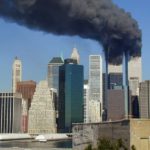9/11, on the 20th Anniversary of ten days after the events
It’s a week or so since 9/11, and the special issues of magazines unsold in the checkout lane are being reported unsold, stripped of their covers and reported destroyed. The television guide on my Roku is no longer choked with 9/11 documentaries and “looks back.” In fact, I can barely tell it happened.
I remember how difficult it was to return to normal after 9/11 — how many days it took before the late night shows could broadcast, for example. It feels like we snapped back awful fast this time.
Well, I didn’t. Here’s my last post on 9/11 for Perfect Duluth Day, looking at some writings, some poetry, after 9/11, talking about what life is like after.
Writing Poetry
In “How to Write a Poem after September 11th,” Nikki Moustaki tells us the moves in writing poetry which are forbidden after 9/11, because, she notes, “the rules have changed.”
First: Don’t use the word souls. Don’t use the word fire …
Don’t say the air smelled like smoldering desks and drywall,
Ground gypsum, and something terribly organic,
Don’t make a metaphor about the smell, because it wasn’t
A smell at all, but the air washed with working souls,
Piling bricks, one by one, spreading mortar.
Don’t compare the planes to birds. Please.
Don’t call the windows eyes. We know they saw it coming.
We know they didn’t blink. Don’t say they were sentinels.
To reflect the experience of New Yorkers, then, Moustaki offers some affirmative rules — what we must say and do. Talking about the World Trade Center, she says:
Say: we hated them then we loved them then they were gone.
Say: we miss them. Say: there’s a gape. Then, say something
About love. It’s always good in a poem to mention love.
Finally, she exhorts,
Press hard. Remember you’re writing with ashes.
How long after 9/11 were we writing with ashes? Are we still writing with ashes today?
On the World Trade Center
David Lehman encapsulates the experience of 9/11 from a New Yorker’s point of view. Lehman was born in New York City in 1948, and earned his PhD from Columbia University; New York is threaded through his soul and work. Author of New and Selected Poems (2013), Yeshiva Boys (2009), When a Woman Loves a Man (2005), The Evening Sun (2002) and The Daily Mirror: A Journal in Poetry (1998), Lehman is as New York as they come.
To the New Yorker, The World Trade Center was a mixed blessing, a landmark and an eyesore. As Lehman wrote,
I never liked the World Trade Center.
When it went up I talked it down
As did many other New Yorkers.
The twin towers were ugly monoliths
That lacked the details the ornament the character
Of the Empire State Building and especially
The Chrysler Building, everyone’s favorite,
With its scalloped top, so noble.
The World Trade Center was an example of what was wrong
With American architecture,
And it stayed that way for twenty-five years (Poetry after 9/11)
Nancy Mercado, reading on PBS, captured the awkward sentiment that follows from losing something you never really liked:
[We] Rush to buy throwaway cameras
To capture your twin ghosts
Frantically I too
Purchase your memory
On postcards & coffee mugs
In New York City souvenir shops
Afraid I’ll forget your façade(“Going to Work,” Poetry after 9/11)
I can’t help but feel, for some authors, that writing about the World Trade Center is a way of writing about, around, the harder events, the traumatic events of the day.
I’ve been to the Memorial. It’s still a way of writing around the events, in some ways.
On a Surprising Patriotism
So many media figures, on this anniversary, talked about the sense of unity many, not all, Americans felt in the days, weeks, years after 9/11.
On their daily trips
Commuters shed tears now
Use American flags
Like veiled women
To hide their sorrows (Nancy Mercado, “Going to Work,” Poetry after 9/11)
And before that I had never purchased an American flag …
but in October I bought two, from immigrants making a tenuous living …
and on Wall Street, no less. (Towle, “Prospect,” Poetry after 9/11)
We united under a flag because it was easier to think about the foreign policy that brought the terrorists into our homes. Are we making better foreign policy choices today?
On Grieving
But mostly we were united in grief. Eileen Myles talks about grieving as almost fidgeting, in which nothing you can do or say is quite right, quite appropriate, for the scale of the loss.
Every deli
tonight is
lit with
mad daffodils
jonquils
baby’s
breath
eucalyptus
pussy willow
blasts of
cox comb
roses,
irises. (“Flowers,” Poetry after 9/11)
Myles works through the flowers, trying hard to build the right bouquet to express her feelings, her loss.
In “Circling,” by Shelley Stenhouse, we get a meditation on where God went, when the Towers fell.
Patti was a good person and she died.
God is probably passed out somewhere warm and dark,
still sleeping off his whole world, seven day binge
and it’s just us, warring unhinged teenagers
trashing this big beautiful park.
Are we still trashing things? Protests of economic and social and environmental injustice. Do we need to break things to make things better? Did we miss an opportunity to make things better 20 years ago?
Aaron Smith, in “Silent Room,” walks us through the motions of grief, the numbness that we try to hide in routines.
Take a drink of water, hold the cup to my lips for 8 counts: curl my toes, stretch my fingers, move my stomach in and out (Poetry after 9/11)
Really, if we just rebuild routines, Smith thinks, we can rebuild normal.
But maybe a return to normal isn’t what we needed — we needed a change. Maybe? I’m so conflicted about what I wanted and what I want in the wake of 9/11, even 20 years later.
Recommended Links:
Leave a Comment
Only registered members can post a comment , Login / Register Here














No Comments